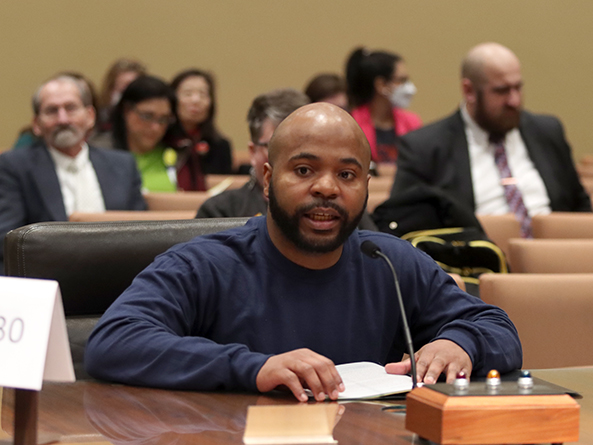Statewide model school dress code considered
A measure that would require all school districts in Nebraska to adopt a written dress code and grooming policy was considered Feb. 14 by the Education Committee.

Under LB630, sponsored by Omaha Sen. Terrell McKinney, the state Department of Education would be required to develop and distribute a model dress code and grooming policy by Dec. 1, 2024.
The model policy would be required to create a positive learning environment while complying with any applicable health or safety laws, rules, regulations, ordinances or resolutions.
McKinney said a recent report authored by the ACLU of Nebraska and other groups highlighted the need to update Nebraska’s dress codes and grooming policies to ensure that students can “show up as their true selves.”
In at least 90 percent of the school districts surveyed, he said, at least one school had a dress code with direct racial or religious implications — including prohibitions on scarves, bandanas and durags — which disproportionately impact students of color. The survey also found vague and subjective rules, he said, and schools that allowed punishments for dress code violations that included missing class time.
“The model policy will facilitate and encourage school districts to provide an inclusive and positive learning environment for our ever-growing diverse student populations,” McKinney said.
Under the bill, the model policy could not:
• target, disproportionately impact, discriminate or be applied in a discriminatory manner against any students on the basis of race, religion, sex, disability or national origin;
• prohibit a student from wearing attire, including religious attire, natural and protective hairstyles, adornments or other characteristics associated with race, national origin or religion; or
• require a student’s hair to be permanently or temporarily altered.
By July 1, 2025, each school district would be required to adopt a code to be implemented at the start of the 2025-26 school year that is consistent with the department’s policy and may include other procedures and provisions that the school board deems appropriate.
Violations of the written dress code and grooming policy would be treated as minor on the continuum of school rule violations and would not subject students to long-term suspension, expulsion or mandatory reassignment — nor require a student to miss substantial classroom or instruction time or school activities.
Under no circumstances could an administrator, teacher, other staff member or contractor temporarily or permanently alter or cut a student’s hair.
Nyomi Thompson of I Be Black Girl testified in support of the proposal, saying expressing one’s culture should not hinder a student’s educational success. Black students are disciplined at a rate four times higher than other students, she said, and are more likely to be disciplined for discretionary reasons like hairstyle violations and dress codes — neither of which have been found to be predictive of student misconduct.
“Penalizing Black hair and hairstyles is an overreach on students’ autonomy and exacerbates racial inequities and academic achievement [disparities],” Thompson said.
Speaking in support of the bill was Rose Godinez of the ACLU of Nebraska. While many school dress codes may not be explicitly discriminatory in their language or intent, she said, they often have a discriminatory effect when enforced.
Kyla Johnson also testified in favor of LB630. Johnson said school personnel in Kilgore, Nebraska cut her two sisters’ hair in 2020 without the family’s permission. Hair is central to Native American identity, she said, and the Lakota people traditionally cut their hair only under specific circumstances and on a full moon.
“One of the important things in our cultural identity is our hair,” Johnson said. “That’s our medicine. It is a connection to our culture. Our hair is equivalent to our strength.”
No one testified in opposition to LB630 and the committee took no immediate action on the bill.


